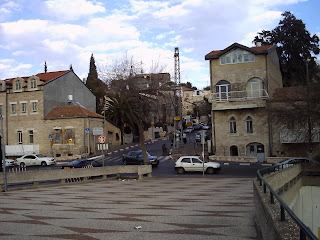
After much thought and contemplation, I decided to return to America, at least for the current time. When that "current time" ends is anyone's guess. Of course, my last moments walking around Yerushalayim (Jerusalem) still move through my veins, as Israel is not a place that one can forget. In fact, according to Rebbe Nachman of Breslov, eventhough I left Yerushalayim, I am closer than ever. He used to say, "Everywhere I go, I am going to Jerusalem," meaning that in every corner of the world in which a Jew finds himself, he is there to do his unique job in that unique space in order to bring the world one step closer to completion, redemption, and the time when we will finally all live in the new, real Jerusalem.
So, for now, I find myself heading toward Jerusalem in America. While learning is something that I truly enjoy, my need for action has gotten the better of me. Having spent my first week back in New York, I am visiting my father for his birthday. My visit this time has proven to be more relaxing and enjoyable, and I don't feel as out of place. Perhaps I am coming more into myself, being able to be myself wherever I happen to be at the moment.

Upon my return to New York, I will start to look through the job opportunities that I found the last few weeks of being in Israel. Ever since I can remember, my aspiration has been to work in a profession where I feel myself making a difference in the world, and hopefully I will find myself working in such a job. I always feel the need to move around and get meaning out of everything in life, add to life, and try to find something new.
During my last few days in Israel, I really think that I got to that place where I was in love with everything that was swirling around me. I began to really stop and appreciate things, and recognize that my life was made up of, as Speed Levitch says, "moments flabergasted to be in each other's presence." However, my hunger and need to experience do not let me sit in one place for too long. It seems that each new place I see, I see a new part of myself. Interestingly, the Yalkut Shimoni (an homiletic telling and explanation of the Torah) says that this is exactly the case. In explaining the creation of man, the Yalkut Shimoni says that G-d gathered dust from the four corners of the world, and everywhere in between, in order to form humanity. And through this, relates the Yalkut, "every place a person walks, from there he was created, and to there shall he return." To me, this validates travel and life experience as part of true religious awakening, which is an infinitely motivating idea. Ahh, emes is good...

I once had a discussion with a man in a bank who simply could not understand a religious experience that didn't revolve around begging G-d for things like A's on tests, lottery winnings, and that your most coveted item at the mall soon goes on sale. I, on the other hand, couldn't fathom a religious experience that included such things. To me, Judaism has never been about finding a cure for life, or ways to escape reality, simply wasting time until some day comes in the future when you're "off to a better place." I've always felt that Judaism was much more honest than that. It's not escaping reality, but engaging in life head on, wrestling with angels and men to bring out the divinity in every place at every instant, knowing that that "better place" isn't found in a new location, but in a deeper understanding of the actuality of the here and now. Judaism doesn't seek to run away from physicality, but elevate it, transforming it by doing mitzvos that connect all planes and times of existence to reveal the hester panim (hidden face of G-d) residing behind creation. When that's the focus of your life, who has time for all the competition and begging? You're a partner with the Ribbono Shel Olam (Master of the Universe) in the continued creation and reparation of the world! That's always been the point of Judaism, and life in general, to me. So, for now, I guess I'm off to keep finding myself in places where I've never been, meeting G-d on new street corners, repairing little parts of creation, each step treading closer and closer to Jerusalem.

















